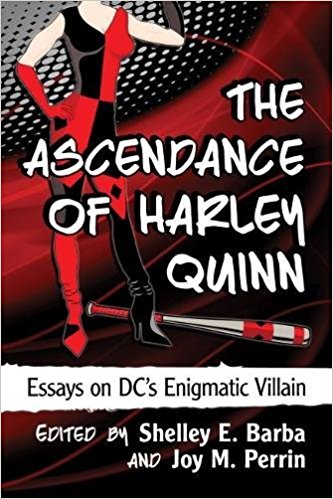The Ascendance of Harley Quinn: Essays on DC’s Enigmatic Villain
By: Hannah Fields

Since her debut in "Batman: The Animated Series" in 1992, Harley Quinn has become one of the most popular villains of the DC Comic universe. Fans have followed her from her days as the Joker's accomplice to teaming up with fellow criminals in "Suicide Squad" and beyond. She has inspired fan art, various cosplay costumes and something unexpected: an academic essay collection.
The first of its kind, "The Ascendance of Harley Quinn: Essays on DC's Enigmatic Villain," was the brain child of Texas Tech University librarians Shelly E. Barba and Joy M. Perrin. The collection, which took three to four years of background work and two years to complete, was inspired by the need for more female representation in the study of female comic book characters.
Because of Harley Quinn's dualities, Barba and Joy wanted the collection to reflect wide-ranging perspectives. With eighteen essays from contributors from Scotland, Ireland, Argentina, Mexico, Poland and the Texas Tech community, they were able to do just that, while gaining new insights along the way.
"One of the things I realized, as controversial as it may be, is that without the Joker there wouldn't be much to write about and Harley Quinn wouldn't be nearly as interesting," Perrin said. "It's interesting how some of the chapters would argue that her relationship with the Joker ends up being feminist or it's not feminist or she has more agency than we're lead to believe or somehow she has less agency. Just looking at it from different perspectives you get a very different sense of what the character means, especially when it relates to the Joker."
These varying perspectives also brought surprising reactions from reader reviews, with some expecting (and preferring) one view of the character and others enjoying the variations. Despite the varied response, readers were still making their way through the collection cover to cover.
"I was shocked to see feedback saying readers had read it cover to cover," Barba said. "When putting it together, I did not think people would read it that way. In all of my experience with academic essay collections, I just read one or two or maybe three chapters. But when people received the reviewer copies they just kept going and they kept wanting to read more."
As for the reason behind Harley Quinn's popularity, both Perrin and Barba had their theories.
"I think she's popular because her character is very dualistic, she both has a good side and a bad side," Perrin said. "She's an unpredictable character, she's more fully fleshed out than maybe other villains or heroes are typically. It's nice to see a female character who isn't worried how other people see her."
"She's vulnerable and I think people like vulnerability in characters, both good and bad," Barba added. "And, personally, I don't know if the Joker is vulnerable at all. We don't know much about him. We just know that he's chaotic and psychotic in a lot of ways. When you see vulnerability in Batman or vulnerability in Harley, where she's not perfect all the time or she has these fatal flaws, it's easier to relate to that and makes a more interesting story. It makes her more real in a lot of ways. I think people latched on to that."
Both Barba and Perrin also hope that as more readers discover the essay collection, there will be more conversations in academic settings about female characters and that those conversations can expand beyond a niche audience. Additionally, they'd like to see more conversations about Harley Quinn, especially as she progresses as a character. One example being her current iteration living an independent life away from the Joker.
All in all, "The Ascendance of Harley Quinn" isn't only unique in its content but in its creation by librarians for the general populous. Just as librarians create organized spaces where people can get to their ideas, they are also filling the gaps where information is lacking.
"This kind of book has all kinds of information about this character, we're combining it for other people and it's a different idea of librarianship," Perrin said. "Instead of me making sure you can get to a book, I'm now writing the book you want to read. Conceptually it's not that far off."
Discoveries
-
Address
Texas Tech University, 2500 Broadway, Box 41075 Lubbock, TX 79409 -
Phone
806.742.3905 -
Email
vpr.communications@ttu.edu
